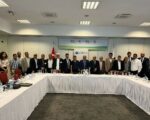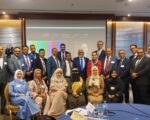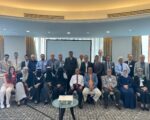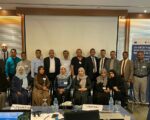The EU-OECD project on Promoting Economic Resilience in Yemen held its fourth Steering Committee Meeting on 13 June 2024 in Amman, Jordan. Dr. Carlos Conde, Head of Division, Middle East and Africa Division, Global Relations Cooperation Directorate led the OECD delegation, which co-hosted the delegation from the Government of Yemen, led by H.E. Dr. Waed Badhib, Minister of Planning & International Cooperation (MoPIC), H.E. Mohammed Ba Naga, Vice Governor of the Central Bank (CBY) and Dr. Safa Matai, Head of the Central Statistical Organisation (CSO). H.E. Gabriel Munuera Viñals, Ambassador of the European Union (EU) to Yemen led the EU delegation.
The goal of the third steering committee meeting was to discuss the achievements of Phase I, the policy recommendations under each workstream, the development objectives of the Government of Yemen and the strategic objectives of the project for the future.
The meeting covered various critical aspects, including economic recovery, governance challenges, infrastructure needs and donor coordination. There were significant discussions on climate change, financial inclusion and the importance of transparent evaluation processes for projects. The participants emphasized the necessity of international partnerships and sustainable development practices moving forward.
On presentations on achievements and recommendations, the following points were made:
- Strengthening governance for efficient state-owned enterprises and addressing challenges in aid dependency and the need to achieve strategic coherence and unity among the donor community to consolidate efforts.
- Promoting financial inclusion, defining SMEs in legal texts, enhancing governance and managing risks to boost performance.
- Improving the regulation of network industries (water, electricity and telecom) as they represent key pillars of economic activity and decent living conditions.
- Increasing access to transaction accounts, implementing financial education programs, developing tailored interventions whilst adopting a holistic strategy to enhance financial well-being in Yemen.
- Optimizing organizational structures and processes along with promoting decentralization as short to medium term measures, while reviewing the existing tax exemptions and adopting VAT as long-term considerations.
- Prioritising climate change and gender equity for the next phase.
Yemeni Authorities responded to the above recommendations by discussing the following points:
- Addressing gaps in developmental dialogue between Yemen’s banking sector and the international community, alongside the sector’s limited capacity to absorb aid.
- Advocating for fixing the currency exchange rate through the central bank and stressing the need for a clear tax policy in Yemen.
- Emphasising the importance of continued capacity building and financial support.
- Underscoring the need to diversify energy sources as well as the EU commitment to continue to support the economic recovery of the country.
Stakeholders agreed on the following next steps:Establish a joint committee for participatory project evaluation to enhance transparency and effectiveness.
- Strengthen statistical capacity and coordination to improve data-driven decision-making.
- Enhance coordination on tax policies among donors to streamline financial support.
- Engage the national government in efforts towards effective donor coordination with increased participation and ownership from the Yemeni side.
- Foster multilateral approaches and partnerships to contextualize Yemen's initiatives within broader regional frameworks.
- Publish progress indicators and lessons learned to inform future phases and enhance public transparency.
- Continue collaboration with OECD to leverage international best practices and frameworks in governance and public procurement.
- Learn from past phases, broaden communication efforts and prepare for upcoming OECD visits to further refine initiatives and sustain progress.




Leave a Reply
You must be logged in to post a comment.